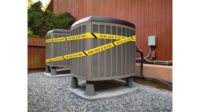Add “increased risk of theft” to the growing list of concerns HVAC contractors face as they grapple with a shortage of supplies and equipment. Both the equipment they install and maintain and the vehicles in which they transport that equipment prove prime targets for thieves. They are growing increasingly bold, but there are tools available for HVAC contractors to protect their property.
Higher commodity prices are the main reason for increased theft of the type that should concern HVAC contractors. Prices for materials such as copper and palladium reached all-time highs in the past year. These metals are often found within HVAC units.
They are also found in the catalytic converters found on all vehicles since the 1975 model year. Criminals have been stealing these at such a pace that some cities are creating special laws concerning their theft. Work trucks make especially inviting targets because of easier access to the converters. A fleet of trucks, such as that found in an HVAC contractor’s parking lot, makes for an especially profitable night.
As prices rise, thieves grow increasing bold. There have been reports of daytime robberies, so even a truck parked in front of a customer’s house becomes a target. An experienced criminal only needs a few minutes under the vehicle with a power saw to take the catalytic converter.
Taking Steps to Prevent Loss
These crimes aren’t new. They were very common over a decade ago, when commodity prices also reached highs. As a result, there are several products on the market for HVAC contractors to help prevent this crime.
One is a steel shield that covers the converter, increasing the time it takes to steal it. Another is a cage made of rebar or other materials that performs a similar task. Steel cables welded to the bottom of the vehicle can also help.
Another piece of advice is marking the catalytic converter to make it harder for the thieves to resell. Some vehicle owners inscribe the device with the VIN. Others paint it a specific color. The idea behind this approach is it makes legitimate scrap metal dealers wary of buying the converters. Of course, it does nothing to stop dealers with lower ethical standards.
Some fleet owners are looking at an unusual solution — placing a GPS device in the catalytic converter. Several GPS providers that have been selling units to track vehicles for decades are now expanding their offerings to other areas. One of this is PassTime, headquartered in Littleton, Colorado.
Four years ago, PassTime started offering the Encore, a device that can be used for non-automotive applications. It’s battery-powered, so it doesn’t need a wired connection for power. The Encore is about the size of a credit card and as thick as a smartphone. It operates off the cellular network.
Manager of fleet operations, PassTime
Putting GPS on Air Conditioning Units
Vince Martinez, PassTime’s manager of fleet operations, said the company recently started marketing the Encore device to the construction market. Representatives have begun attending trade shows, such the Colorado Contractors Association and World of Concrete.
“We have every type of contractor come up to us asking about every kind of equipment,” Martinez said.
This includes placing the device inside of catalytic converters. The Encore sends out an alert twice a day when in normal mode, basically sending an “all is well” signal. The owner can switch modes if movement is detected. Another signal is sent out when the device starts moving, and other modes allow the owner to track the property. Active tracking does place more stress on the battery.
Some contractors are also attaching GPS devices to air conditioning units. A home builder in the Memphis area recently recovered several stolen units using GPS devices. The report on the theft and eventual recovery didn’t specify the type of GPS devices used.
Martinez said the Encore unit by itself is sensitive to vibration on its own. It does fit into a heavy-duty case that is IP67 rated. The device can be attached using either ties or industrial magnets.








